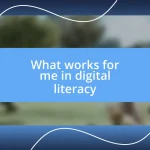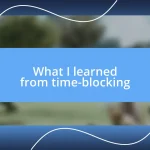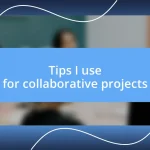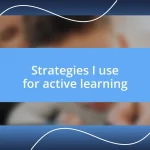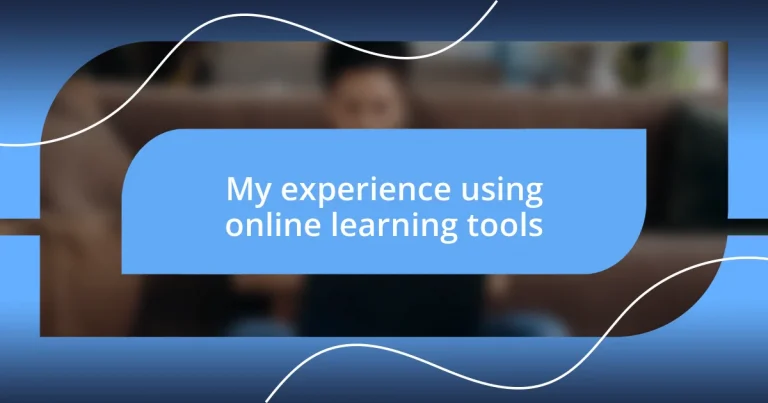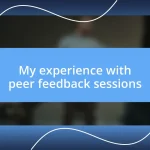Key takeaways:
- Embracing online learning brought flexibility and comfort, allowing for a personalized and engaging experience.
- Key features for effective online learning include user-friendliness, diverse content formats, and interactive elements that foster collaboration.
- Establishing structure, incorporating varied learning styles, and engaging with peers were essential strategies for maintaining motivation and understanding.
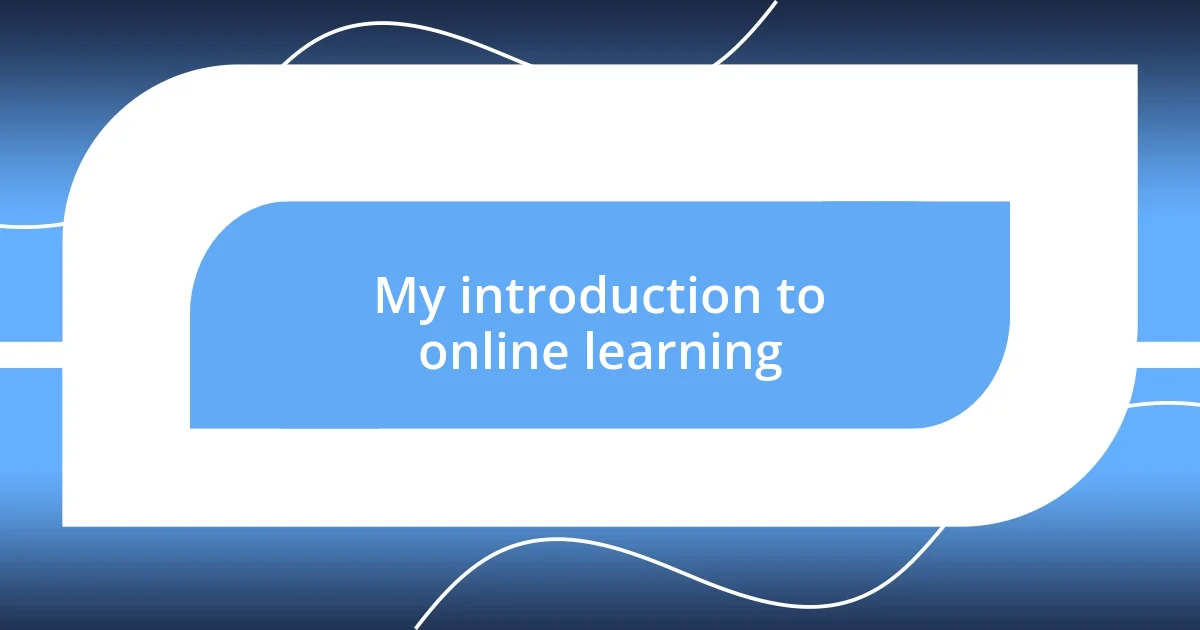
My introduction to online learning
My introduction to online learning was a bit of a surprise, to be honest. I remember feeling overwhelmed at first, staring at the endless options available. Could this new method really work for me, or would it just add to my already busy schedule?
As I dove in, I quickly discovered the flexibility it offered. One evening, I found myself sitting on my couch in pajamas, sipping tea while attending a live webinar. That moment was liberating—I realized that learning could be comfortable and convenient, transforming my perception of education entirely.
There were challenges, of course, like grappling with distractions at home. Yet, through these hurdles, I developed a sense of self-discipline I didn’t know I had. I often reflected on how empowering it felt to take control of my learning journey. Isn’t it fascinating how technology can reshape our approach to education?
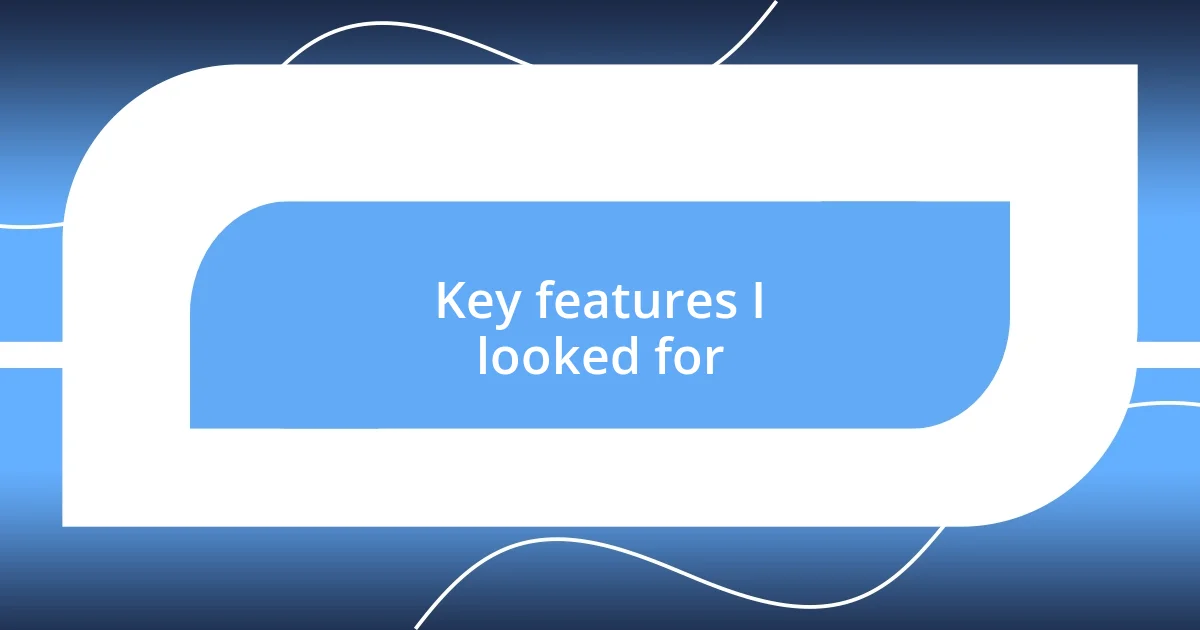
Key features I looked for
When I explored online learning tools, I paid close attention to user-friendliness. It made a world of difference when I could navigate the platform without feeling lost. For instance, I remember my frustration with certain tools that had complex interfaces. Simplicity isn’t just nice; it’s essential for effective learning.
Another feature I valued was the availability of diverse content. I appreciated platforms that offered various formats, like videos, quizzes, and articles, catering to different learning styles. Watching a video on a particularly challenging topic helped me grasp concepts that text alone couldn’t convey. It felt like having a personal tutor, which I found incredibly motivating.
Lastly, I looked for interactive features. Engaging with fellow learners or instructors added a social element that I didn’t expect. Once, during a group discussion, I shared my thoughts on a project, and the feedback I received spurred my creativity. It highlighted how essential collaboration is in an online learning environment.
| Feature | Importance |
|---|---|
| User-friendliness | Helps in easy navigation and reduces frustration |
| Diverse content | Caters to different learning styles, enhancing understanding |
| Interactive features | Encourages collaboration and peer learning |
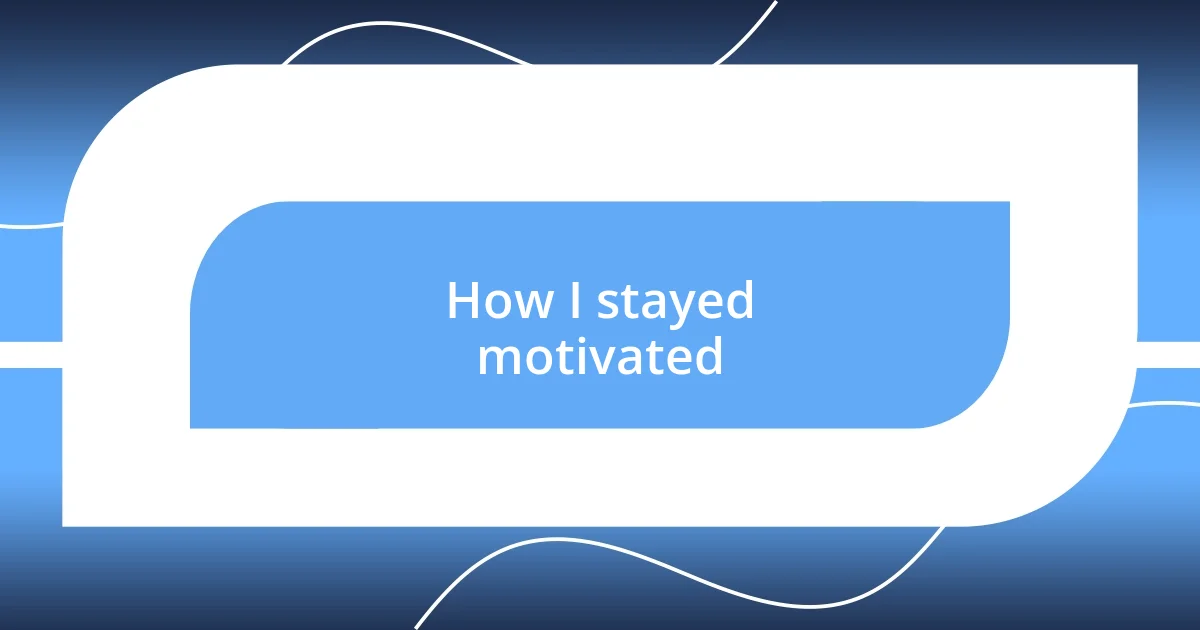
How I stayed motivated
Staying motivated during my online learning journey was a dance of inspiration and self-discipline. I often set small, achievable goals for myself, like completing a module before lunch. Every little victory felt like a win, adding a spark to my motivation. One day, after finishing a particularly tough assignment, I treated myself to a favorite dessert. It’s these little rewards that made the process enjoyable and kept me pushing forward.
To maintain my motivation, I relied on a variety of strategies:
- Setting a study schedule: Consistency helped create a routine that felt almost like going to class.
- Joining study groups: Engaging with peers created a sense of community, making lessons more dynamic.
- Tracking progress: I kept a visual chart of what I accomplished, which fueled my desire to fill it up.
- Celebrating milestones: Every time I completed a module, I paused to acknowledge the achievement—like a mini-celebration.
- Incorporating breaks: I made sure to step away from the computer and recharge, preventing burnout.
Finding what worked for me was crucial. By recognizing the importance of these elements, I discovered a balance that kept my motivation alive throughout my online learning experience.
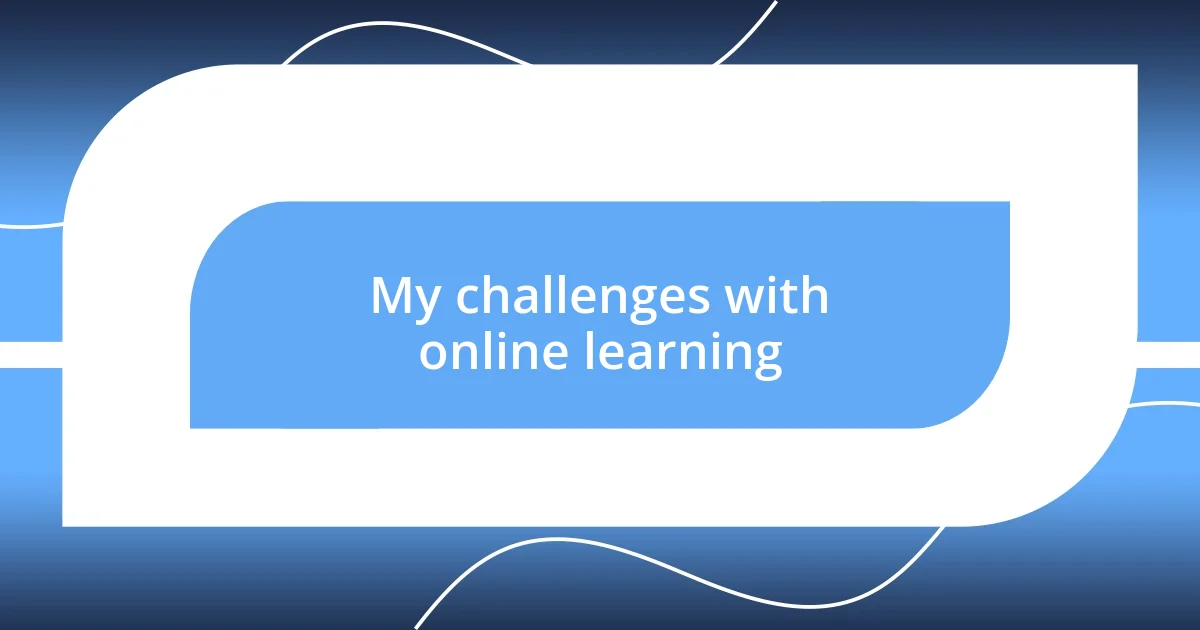
My challenges with online learning
Online learning brought about its own set of challenges for me that I didn’t initially anticipate. One significant hurdle was the overwhelming volume of information. I often found myself questioning, “How can I absorb all this?” During one marathon study session, I realized I had over-stuffed my brain with notes and resources. The stress of trying to remember everything felt paralyzing, making it harder to focus on what truly mattered.
Another challenge was the lack of immediate feedback. In traditional classrooms, I thrived on spontaneous interactions and real-time discussions. I vividly recall submitting an assignment and staring at my computer screen, eagerly awaiting feedback. Unfortunately, the wait was long, and I couldn’t gauge if I was on the right track. This sense of uncertainty sometimes left me frustrated, craving that reassuring nod from a teacher.
Lastly, I struggled with maintaining self-discipline. While I enjoyed the freedom of online learning, it was easy to get distracted. I remember setting up my workspace with all the best intentions, but then I’d find myself wandering off to scroll through social media. It raised the question—how do you stay accountable when there’s no one watching? Over time, I learned that creating a dedicated study environment and turning off notifications helped, but it wasn’t a perfect solution. Each challenge contributed to a rollercoaster experience that ultimately shaped my growth in digital education.
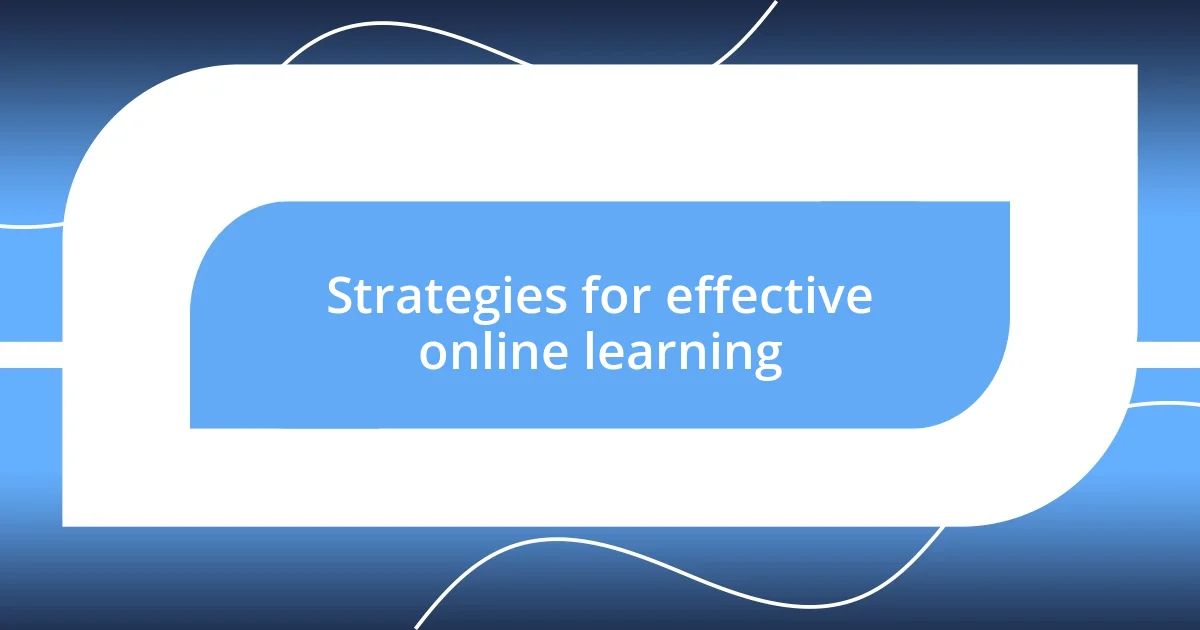
Strategies for effective online learning
Establishing a structured study schedule was a game changer for me. At first, I viewed the flexible nature of online learning as a free pass to study whenever. However, I soon realized that without a routine, I was prone to procrastination. By setting designated times for studying, almost like attending a virtual class, I found it significantly easier to stay on track and focused.
Incorporating diverse learning formats was another successful strategy in my online journey. I remember experimenting with different tools—video lessons, podcasts, and interactive quizzes. Each format kept things fresh and engaged me in unique ways. It’s fascinating how a simple shift in how information is presented can light a spark of curiosity. Have you ever noticed the difference a change in medium can make in your understanding? For me, this exploration led to deeper comprehension and retention.
Finally, engaging with fellow learners opened up a world of support. I created a small online group, and our vibrant discussions became a highlight of my learning experience. Sharing insights and tackling challenges together fostered a sense of belonging. It reminded me that even in the virtual realm, connection is powerful. Those shared moments made every late-night study session feel a little more manageable and a lot more enjoyable.
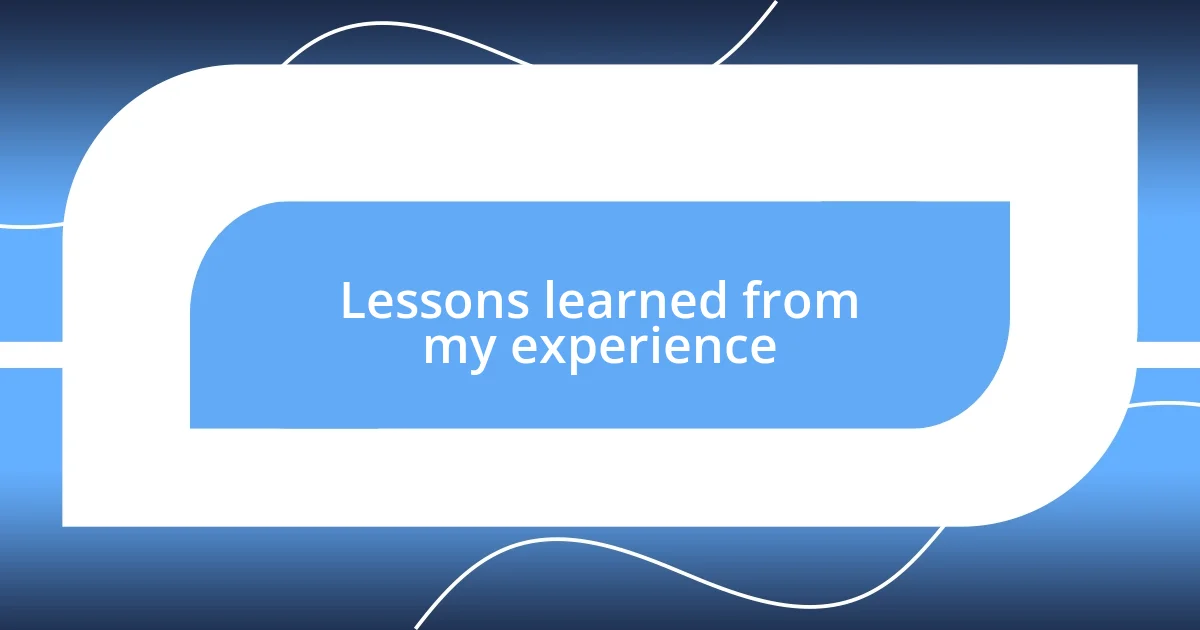
Lessons learned from my experience
One of the biggest lessons I learned was the importance of pacing myself. There were days when my ambition propelled me to cram in hours of study, but it quickly backfired. I remember one particularly exhausting afternoon when I tried to binge-learn multiple subjects. By the end, all I’d absorbed was fatigue and frustration. It dawned on me that taking breaks and spreading out my study sessions not only improved my comprehension but also made learning enjoyable again.
Another valuable insight came from my experimentation with self-assessment tools. Initially, I avoided them, thinking they’d only add to my workload. However, I stumbled upon a quick quiz that cleverly summed up the chapter I had just finished. To my surprise, not only did it reinforce my learning, but it also provided instant feedback—a little ‘aha moment’ that confirmed I was on the right track. Have you ever doubted your understanding until a simple quiz made everything click? Those moments taught me that assessments aren’t just for grades; they’re an essential part of the learning process.
Engaging in discussions with peers was another transformative lesson. One evening, I found myself in a lively debate over a complex topic in our study group. The energy was contagious, and suddenly the material I had struggled with was coming alive through our conversation. It made me realize that learning doesn’t just stop at consuming information; it thrives in interaction and collaboration. Have you ever felt a subject come to life while discussing it with someone? I certainly did, and it reinforced the idea that sharing knowledge can ignite passion and deepen understanding like nothing else.


